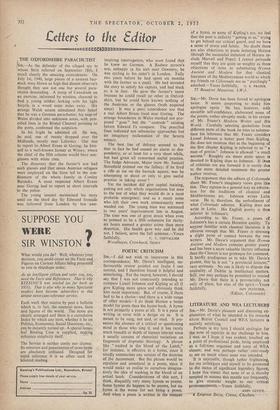SIR,--Mr. Davie has been forced to apologise twice. It seems
unsporting to make him apologise again. He has, however, with enviable self-confidence, elaborated some of the points, rather abruptly made, in his review of Mr. Fraser's Modern Writer and His World. Carefully selecting quotations from different parts of the book he tries to substan- tiate his inference that Mr. Fraser considers Lionel Johnson a better poet than Kipling. He does not mention that at the beginning of the first chapter Kipling is referred to as " a man of genius." Johnson is allowed " a small success." Roughly six times more space is devoted to Kipling than to Johnson. If Met of criticism are put forward it is surely due to the more detailed treatment the greater author receives.
The argument that the editors of Colonnade share Mr. Fraser's imaginary views goes like this. They express in a general way an admira- tion for the traditions of classical and Mediterranean art. Johnson writes Latin verse. He is:therefore. the embodiment of what Colonnade admires. Kipling does not write in Latin. His English poetry is thus inferior to Johnson's.
According to Mr. Fraser, a poem of Johnson's has a certain Horatian quality. To anyone familiar with classical literature it is obvious enough that Mr. Fraser is stressing a slight point of contact between the two writers. Mr. Davie's argument that Hymns Ancient and Modern contains greater poetry and has been a more valuable literary influence than the Classics is too grotesque for comment. It hardly predisposes us to take Mr. Davie's protest, that he is not " a provincial lecturer," very seriously. No one is likely to dispute the centrality , of Dublin in intellectual matters. Still, one may perhaps be permitted to remind Mr. Davie that there is a provinciality not only of place, but also of the spirit.—Yours (Editor, Colonnade)


















































 Previous page
Previous page